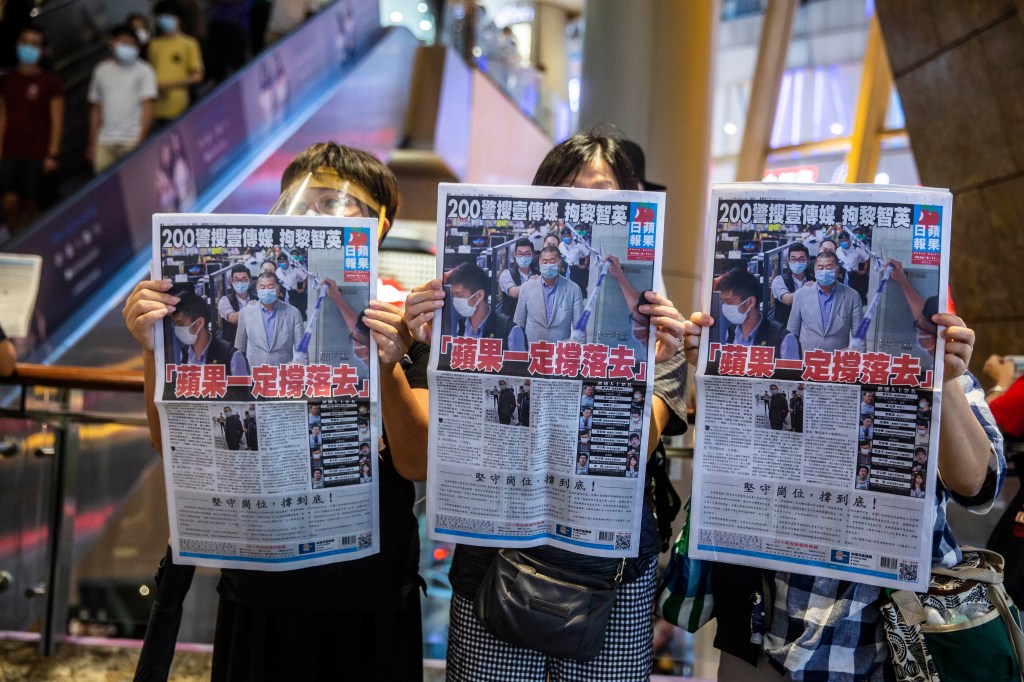The impact of Hong Kong’s new security law was felt by journalists this week with the police raid of the Apple Daily newsroom and arrests intended “not just to thwart [the founder Jimmy] Lai and his media group, but to intimidate Hong Kong’s entire community of journalists,” wrote CPJ’s Asia Program Coordinator Steven Butler in an Op-Ed this week. Journalists in Hong Kong told CPJ that they predicted press freedom would be further infringed under the new law, which came into effect on July 1. One expert described it by using the metaphor of tiptoeing under a python in a chandelier, hoping it doesn’t strike.
Since disinformation became a flash point in the debate over content moderation on social media, distinguishing propaganda from public service news has become a priority for companies that operate global platforms. Following Twitter’s decision to start labeling some accounts run by media outlets and their top editors as “state-affiliated,” CPJ Advocacy Director Courtney Radsch examines how tech platforms wrestle with state-controlled media and whether their tactics are effective.
Global press freedom updates
- Family members of journalists imprisoned in Egypt tell CPJ of their fears for their loved ones after the death of reporter Mohamed Monir, who contracted COVID-19 in pretrial detention
- Algerian journalist Khaled Drareni is sentenced to three years in prison in relation to protest coverage
- Anti-Muslim crowd in Delhi assaults three journalists with The Caravan Indian magazine
- Kyrgyz authorities arrest an Uzbek journalist following extradition request
- Authorities in Ethiopia detain four journalists and one media worker amid unrest
- Iraqi federal police detain Kurdish broadcasting crews on assignment in Kirkuk
- Cuban security forces detain journalist, interrogate her about news agency director
- Police attack Nigerian journalist Sikiru Obarayese as he covers COVID-19 lockdown
- Protesters attack Bolivian photojournalist David Sapiencia
- Malaysia refuses to renew two Al-Jazeera reporters’ visas amid investigation
- CPJ speaks to freelancer Vladimir Sevrinovsky about covering COVID-19 in the North Caucasus
- Iran shuts down economic newspaper for COVID-19 reporting
- Somali military court acquits radio journalist Mohamed Abdiwahab Nuur
- CPJ joins a coalition of over two dozen non-profit organizations and civil society groups in calling on the Government of Jammu and Kashmir to restore high speed internet in the Indian state
Spotlight
In Lebanon, security forces and demonstrators attacked and injured over a dozen journalists covering protests triggered by the massive explosion in Beirut’s port on August 4. Journalists based in the city spoke to CPJ about the personal impact of the destruction, and what it was like to report on the immediate aftermath.
In Belarus, police attacked and detained journalists during protests that erupted this week after incumbent President Aleksandr Lukashenko declared a landslide victory in an election that was contested by the political opposition. During the protests, police have detained journalists, shot them with rubber bullets, and beaten them with clubs.
CPJ Emergencies continues to provide up-to-date advice and information on ways journalists can cover civil disorder safely. Journalists and editors are encouraged to bookmark our safety note on covering protests, as well as our digital safety kit and psychological safety advice.
Join CPJ’s Advocacy Director Courtney Radsch and the digital rights organization Bolo Bhi for an online event titled, “Weaponization of ‘fake news’ by governments,” on Monday at 1 p.m. EDT, 10 p.m. Pakistan time. The event will be livestreamed on Facebook.
What we are reading
- Amid an election and an uprising, Belarus cracks down on protesters and journalists — Jon Allsop, Columbia Journalism Review
- Rights activists ‘worried’ by Zimbabwe President Mnangagwa’s speech — Deutsche Welle
- Women, power and the newsroom — Louise Donovan, Daily Nation
- Weighing the impacts of network shutdowns and service restrictions — Global Network Initiative
- TikTok Ban: A Seed of Genuine Security Concern Wrapped in a Thick Layer of Censorship — Eva Galperin, David Greene, and Kurt Opsahl, Electronic Frontier Foundation
- Conveying Truth: Independent Media in Putin’s Russia — Ann Cooper, Shorenstein Center on Media, Politics and Public Policy at Harvard Kennedy
- Off the Record: An interactive narrative about the reality of working as a journalist of color — Study Hall
